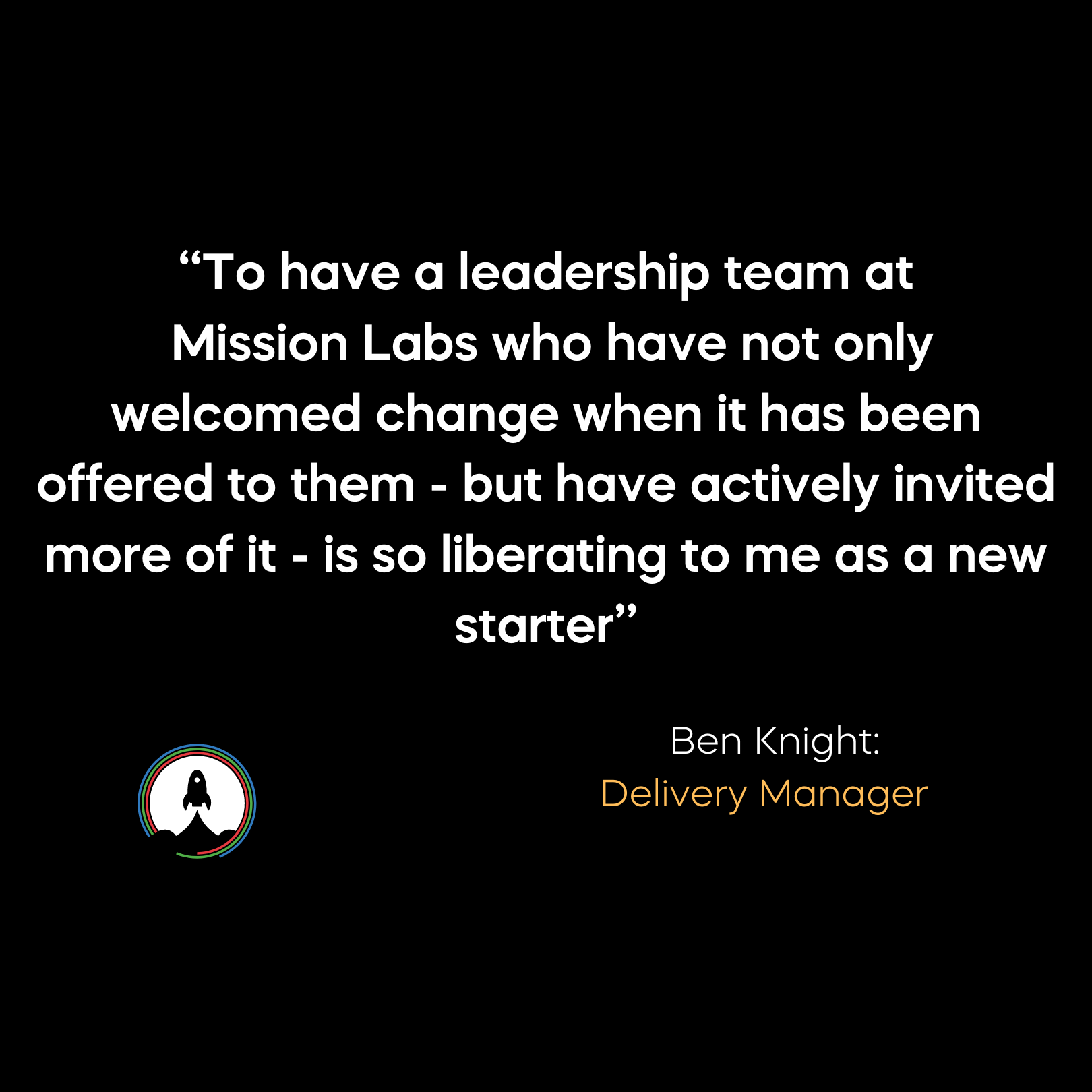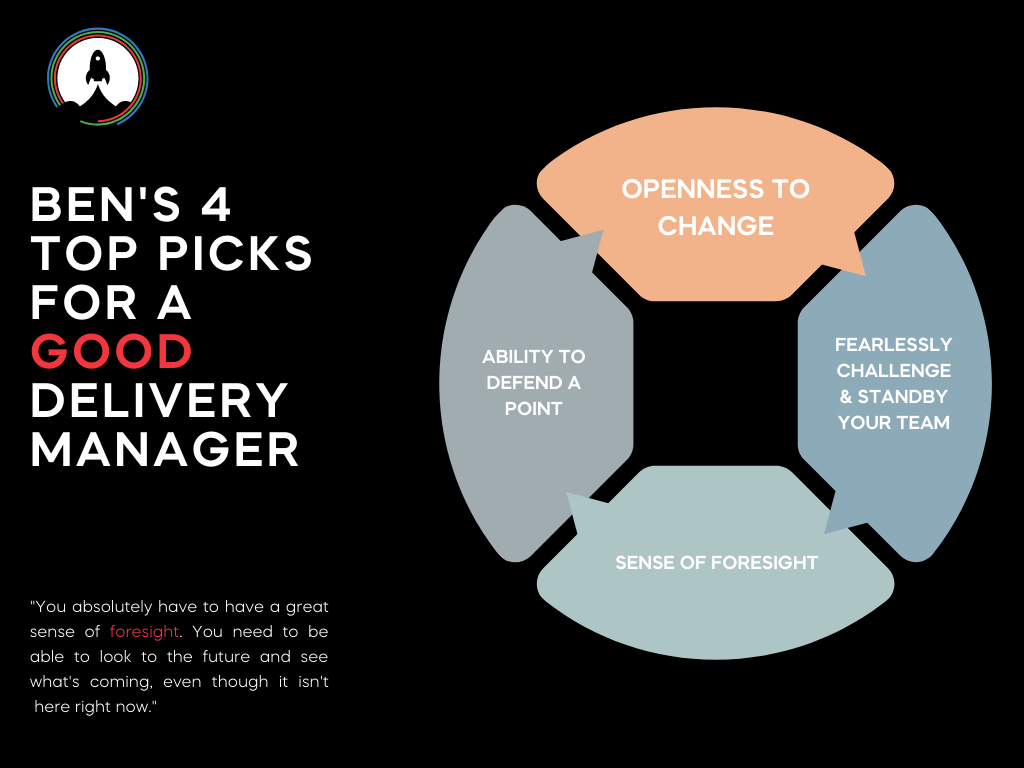We speak to Cath and Vicky in the People & Culture team about current recruitment at Mission Labs.
What Does a Career at Mission Labs Look Like? Volume 1.
October 29th, 2020

What does a career at Mission Labs Look Like?
Ben Knight, Delivery Manager.
We caught up with Ben to discuss all things agile, delivery and working from home.
Josh Healey: Ok Ben to get things started: you have 30 seconds to give me an elevator pitch detailing who you are, where you come from and what you do.
Ben Knight: I’m ben knight - I’m a delivery manager at Mission Labs. I was brought in to introduce the concept of delivery at Mission labs; to take the standard idea of project management and turn it on its head.
So, instead of starting with a deadline and a goal and working out who you need to get there, instead you start with who you’ve already got, how much they need to develop , and work out how far that is going to take you toward your goals. You then assess what you can realistically achieve in that time.
JH: And how long have you been doing that for Mission Labs?
BK: I thought I’d been here four weeks but turns out it’s been 6 weeks.
JH: Does it feel like you’ve been here 6 weeks?
BK: It feels like i’ve been here for ages but like I’ve also just arrived. A lot of people have remarked the same.
JH: Why do you think that is?
BK: I didn't set out to change things on my first day. But I did introduce things on my first and second day which are now fully in use. Because people have only just started using these practices they feel quite new; I suppose they remember the years’ prior where things were done a little differently. So much has changed in a short space of time and I think it gives the illusion that I must have been here a long time to be able to make big changes. I try to take it as a compliment, we’ll see how it turns out!
JH: With that said: how important then is it to have a management team who are open to change?
If you don’t have people at the top ready to listen and ready to implement positive changes if they are the right thing to do, then you are knackered from day one. I’ve seen examples in previous companies where people say things like my door is always open - and it is - so that they can tell you why it is the way it is - and then you turn back around. It's not open for you to walk in and tell them if something could be done better. Sometimes you don’t know the answer but you just need feedback that something isn't right.
To have a leadership team at Mission Lab who have not only welcomed change when it has been offered to them - but have actively invited more of it - is so liberating to me as a new starter.

JH: So, what has been your biggest challenge working at Mission Labs so far?
BK: To remain respectful to the fact that this is a company who have been very successful as a result of the decisions they’ve made, but also that they've been successful in spite of the decisions they've made. When something is not the way you think it ought to be, you must be mindful that it was put into place with the best of intentions. So respecting that while also looking at what can be pushed forward is difficult, but it’s important to do. It’s not like everything needs changing - but it’s important to identify where the short term and long term improvements can be made and then voice them in a constructive and considered way.
JH: Good answer mate.
BK: I try.
JH: Conversely, biggest achievement?
BK: I made my biggest changes virtually on day 1. Law of diminishing returns suggests that I will likely make less radical changes as time goes on. But, I’m now building on those early changes I made. It’s like I said at the beginning: turning the idea of project management on its head and becoming delivery management. Implementing the idea of a delivery roadmap which was clear and visible to all is something I am pleased with. I’ve been building this iteratively, so now 6 weeks on my teams hopefully feel empowered to influence their own destiny, whether it's a director or a developer.
JH: And how does this look practically speaking?
BK: Facilitating these iterative conversations creates meaning and helps boost productivity. These conversations would not have been as easy to pull off without those early changes. So it might be that I identify when a developer has made a fantastic suggestion. But if they were to pair with this other person instead of working in a silo, then they should be able to do their work even more efficiently and possibly be able to take on multiple projects simultaneously as a result.
JH: So, it’s a move away from autocratic decision making?
BK: Yes that was part of the goal. We’re moving toward an autonomous model where teams elect to say how much they can achieve and what is possible for them to do and then - very crucially - how they want to do it. Some of my team are already pushing back on me, to say: ‘’you can’t commit to this deadline Ben because we haven’t achieved the standard we originally set out”. My contribution is to respect that, and reject other works which won’t allow that standard to be hit.
JH: Let’s take a light-hearted left turn: if you lived in medieval England what do you think your profession would be?
BK: My profession would almost certainly be court jester. I have a few random skill sets which might lend to the era - I can play a little bit of the flute and the harp - make some jokes here and do a bit of juggling there. There is no master sword fighter or master archer going on here, it’s more like : ‘hey, he can do a little bit of all these different things’.

JH: How have you adapted to working from home during COVID-19?
BK: When COVID hit in March I was in a different role and had already been through the difficult team forming stages. Everyone trusted everyone and areas of expertise were well understood.
We’re having to artificially prompt things which would normally happen in an office naturally. It’s not always the ideal method but it’s crucial we do this.
When I started at Mission Labs I was told to give two truths and a lie as part of a company wide icebreaker. One of my truths was that I am scared of Orcas. So, we ended up adding an Orca emoji to Slack. Now anything that scares me - such as dates slipping on a project - is accompanied by an Orca emoji. These little rituals and jokes create room for humour and keep us a little more connected.
Through the magic of remote working I suppose we can still share human interaction which helps us to bond; it’s important to share the things you can share. Facts and experiences, jokes and what you got up to at the weekend. If of course you want to do so!
JH: And how do you manage your teams remotely?
BK: I make sure I am available. I try to leave time in my day which is not allocated so I can help people when things catch fire. These things do not need to be work things. I spent an hour this morning speaking to one of my team because they needed to talk. It became apparent on the call that he needed someone to speak to beyond the realms of the tasks he was working on...
Even though there was no physical connection because it was remote, people still need a human connection. Simply being available and letting them know that somewhere was there for them today. I would like to think this would make them feel good knowing they could speak to someone, but also from a practical perspective, people tend to do their best work when they are not preoccupied with worries.
JH: Lastly, If you had to sum up the 4 most essential traits for a good delivery manager what would they be?
BK: Oh god. Okay…
- openness to change
- ability to defend a point and drive through with it
- stand by and challenge your team fearlessly
- sense of foresight
Think you can help us bring the future forward faster?
We’re always looking for talented people to join our passionate, hard-working and results driven team. If you think you have what it takes then head over to our careers page and see how you might play your part.
Want to read more ?
You might like...
A Year of Lockdown for Mission Labs: What Have We Learned?
It's been a year of challenge and change for Mission Labs... here's everything we learned from lockdown.
How Cloud Comms Could Play a Role in Returning to the Office Safely.
As we see more businesses return to the office this year, we look at how cloud-based communications can enable safe office working for your staff.


